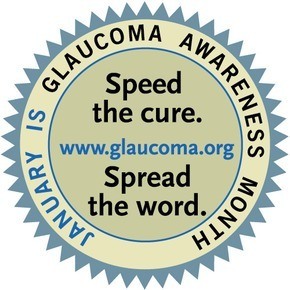We made a post at the beginning of the month announcing that the month of January is “Glaucoma Awareness Month”. The article touched on research surrounding the disease, some basic facts and figures on the number of glaucoma cases in the U.S., and ways to get involved in the search for a cure. And now that January is coming to a close, we thought we’d circle back and give our readers one last post to think on concerning glaucoma.
 Our friends at glaucoma.org have boiled it down to 4 facts they think everyone should know:
Our friends at glaucoma.org have boiled it down to 4 facts they think everyone should know:
1. Glaucoma is a leading cause of blindness
Glaucoma can cause blindness if it is left untreated. And unfortunately approximately 10% of people with glaucoma who receive proper treatment still experience loss of vision.
2. There is no cure (yet) for glaucoma
Glaucoma is not curable, and vision lost cannot be regained. With medication and/or surgery, it is possible to halt further loss of vision. Since open-angle glaucoma is a chronic condition, it must be monitored for life. Diagnosis is the first step to preserving your vision.
3. Everyone is at risk for glaucoma
Everyone is at risk for glaucoma from babies to senior citizens. Older people are at a higher risk for glaucoma but babies can be born with glaucoma (approximately 1 out of every 10,000 babies born in the United States). Young adults can get glaucoma, too. African Americans in particular are susceptible at a younger age.
4. There may be no symptoms to warn you
With open-angle glaucoma, the most common form, there are virtually no symptoms. Usually, no pain is associated with increased eye pressure. Vision loss begins with peripheral or side vision. You may compensate for this unconsciously by turning your head to the side, and may not notice anything until significant vision is lost. The best way to protect your sight from glaucoma is to get tested. If you have glaucoma, treatment can begin immediately.
These quick facts are a bit overwhelming, right? That’s why we all need to join the cause for finding a cure.
And of course, take care of yourself and your eyes. Make sure to schedule regular eye exams for you and your loved ones. Early detection is key to fighting symptoms. Until there is a cure, awareness is our best weapon.

